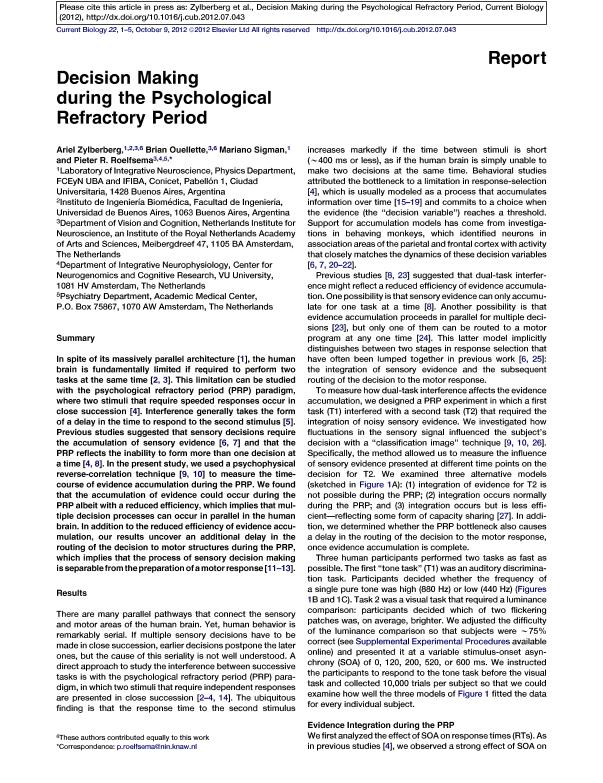Artículo
Decision making during the psychological refractory period
Fecha de publicación:
10/2012
Editorial:
Cell Press
Revista:
Current Biology
ISSN:
0960-9822
Idioma:
Inglés
Tipo de recurso:
Artículo publicado
Clasificación temática:
Resumen
In spite of its massively parallel architecture [1], the human brain is fundamentally limited if required to perform two tasks at the same time [2, 3]. This limitation can be studied with the psychological refractory period (PRP) paradigm, where two stimuli that require speeded responses occur in close succession [4]. Interference generally takes the form of a delay in the time to respond to the second stimulus [5]. Previous studies suggested that sensory decisions require the accumulation of sensory evidence [6, 7] and that the PRP reflects the inability to form more than one decision at a time [4, 8]. In the present study, we used a psychophysical reverse-correlation technique [9, 10] to measure the time-course of evidence accumulation during the PRP. We found that the accumulation of evidence could occur during the PRP albeit with a reduced efficiency, which implies that multiple decision processes can occur in parallel in the human brain. In addition to the reduced efficiency of evidence accumulation, our results uncover an additional delay in the routing of the decision to motor structures during the PRP, which implies that the process of sensory decision making is separable from the preparation of a motor response [11-13]. © 2012 Elsevier Ltd. All rights reserved.
Palabras clave:
Decision Making
,
Psycological Refractory Period
Archivos asociados
Licencia
Identificadores
Colecciones
Articulos(IFIBA)
Articulos de INST.DE FISICA DE BUENOS AIRES
Articulos de INST.DE FISICA DE BUENOS AIRES
Citación
Zylberberg, Ariel Dario; Ouellette, Brian; Sigman, Mariano; Roelfsema, Pieter R.; Decision making during the psychological refractory period; Cell Press; Current Biology; 22; 19; 10-2012; 1795-1799
Compartir
Altmétricas




